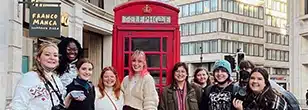Opening a Bank Account
If you are going to be in the U.S. for an extended period of time, it’s a good idea to open a U.S. bank account to manage and access your finances. Even if you are not doing a paid internship, you may want to consider opening a U.S. bank account to help cut down on fees your own bank may charge for international use.
If you are doing a paid program, you may want to choose the bank that your employer uses, especially if your employer offers direct deposit, a process through which your employer will electronically transfer your paycheck directly into your checking account. Below are the necessary steps for opening a bank account in the U.S. and some things to keep in mind.
Exploring Your Options
Most checking accounts in the U.S. are free to open! Do some research and visit some of the branches in your neighborhood or near your internship: you can meet one-on-one with someone at the bank who will explain how it all works. Some banks will also have special promotions for students. You should also ask roommates, American friends, and co-workers which banks they would recommend using. You will want to think about where the bank is located and where they may have other branches and ATMs available.
Questions to Ask
- Do you have a minimum required amount to open an account or a minimum daily balance? Some banks require a certain amount of money to be in your account at all times.
- What are the interest rates for a checking or savings account?
- Do you have a maintenance fee? Some banks charge a monthly or yearly “maintenance” fee, usually about $5, but this varies from bank to bank and may depend upon how much money you keep in your account.
- What additional fees do you charge? Are there overdraft fees? ATM fees?
- How long does it take to “clear” a check? (that is, how long from the time a check is deposited into your account before you will be able to access or withdraw your money?)
- Do you have online banking or an app? Most banks have a secure website where you can view your balance and transfer money and many banks will now even let you deposit checks by taking a photo via your smartphone. (Keep in mind that banking apps may not be available if you select a smaller, local bank.)
- As an exchange visitor to the U.S. on a J-1 Intern visa for x number of months, is there anything I should know about banking with you?
Documents Needed
Keep in mind that each bank has its own requirements and may require different or additional documentation (particularly forms of identification) from the list we’ve provided below. Check your chosen bank’s requirements online before going in person to open your account.
- Your passport with your J-1 Visa
- DS-2019 Form
- DS-7002 Form (Training Plan)
- I-94 printout or card
- Your Social Security card (if you have already received it)
- Your full name, living address in the U.S., phone number, and place of employment. Some banks might ask for your lease or something showing your local address, like a utilities bill.
- Your student ID card (if you have one)
- Government ID from your home country (if you have one)
- A credit card (if you have one; it can also be used as a form of ID)
What to Expect
- When you go into a bank’s branch office, someone will greet you and ask how they can help you. Tell them that you are interested in learning about opening an account with them.
- You might have to schedule a time to come back later and meet with someone, or they will see if an associate is available to help you right then.
- You will probably want to open a checking account, and these usually have a savings account attached.
- If you are doing direct deposit with your employer, they can automatically have your paycheck deposited into one (or both) of these accounts.
- Make sure you have the documents listed above with you!
- The bank associate will go over some questions with you, such as biographical information and contact information, when setting up your account.
- Make sure you tell them that you are an exchange visitor in the U.S. for x number of months on a J-1 Visa, participating in an internship. They will probably ask you questions about what you are looking for in an account and assess your needs. As mentioned earlier, you will most likely want to open a basic checking account that will come with an ATM/debit card.
- You will choose a PIN (Personal Identification Number), which is the code needed to access your account at an ATM when you withdraw cash.
- If you wish to have paper checks to pay rent and bills, you will have to ask and pay for them, and the bank will order them for you.
- Your ATM card will probably be mailed to you and will require you to go to an ATM to activate it for the first time.
- Make sure to take the bank associate’s name and contact information in case you have additional questions or concerns.
- For day-to-day transactions and general banking, you can always wait on line to speak with a bank teller.
To just withdraw cash, you would only need to go to an ATM. - You should also have the toll-free number for the bank in case of any emergencies, such as losing your card so they can cancel it and send you a new one.
After You’ve Opened Your Account
- Always keep anything bank related, such as account numbers and checks, in a safe place at home. You should never give out your account number or checkbook to anyone. Don’t share your ATM card or PIN number with anyone. Your host employer, however, will need some of this information if you wish to set up direct deposit, but they will never need your PIN.
- Keep the phone number for your bank with you or stored in your phone. If your ATM card is lost or stolen, you will need to call this number to report it and have a replacement mailed to you.
- Always be aware of how much money is in your account to avoid any overdraft fees or bounced checks.
- Withdraw cash at ATMs associated with your bank to avoid fees for using your card through a different bank.
- Use ATMs at banks or inside stores. Try to avoid using ATM machines on sidewalks where passersby can see you withdrawing cash or entering your PIN number.
- Check your account details on your bank’s website to ensure there are not any erroneous charges or fees that were not explained to you.
- If you will travel home during your internship and wish to withdraw cash from your U.S. bank account or use your debit card, be sure to call your bank in advance to notify them of your travel plans. Otherwise, they may suspect someone stole your card. Many banks now will let you enter travel information through your online account.














